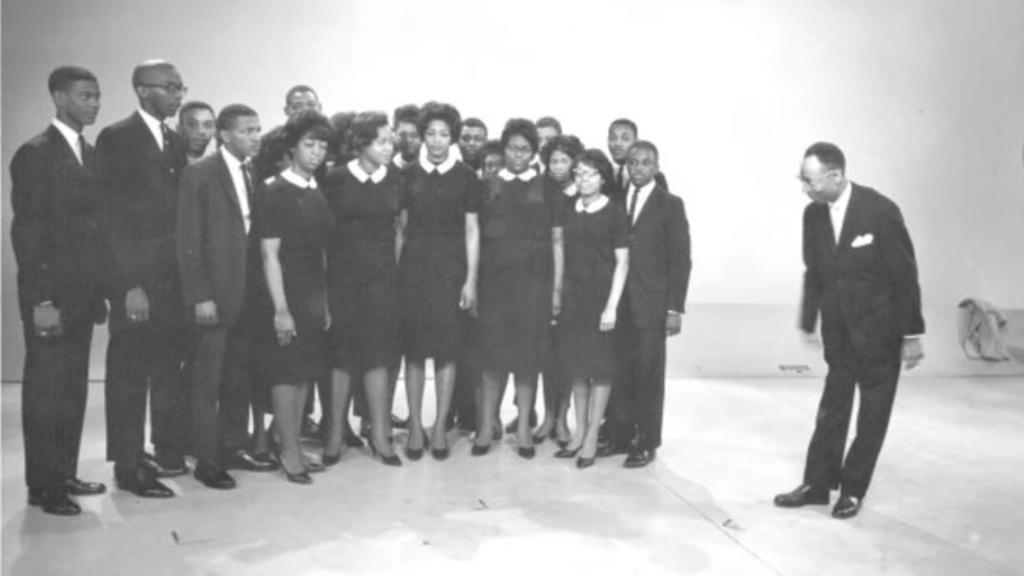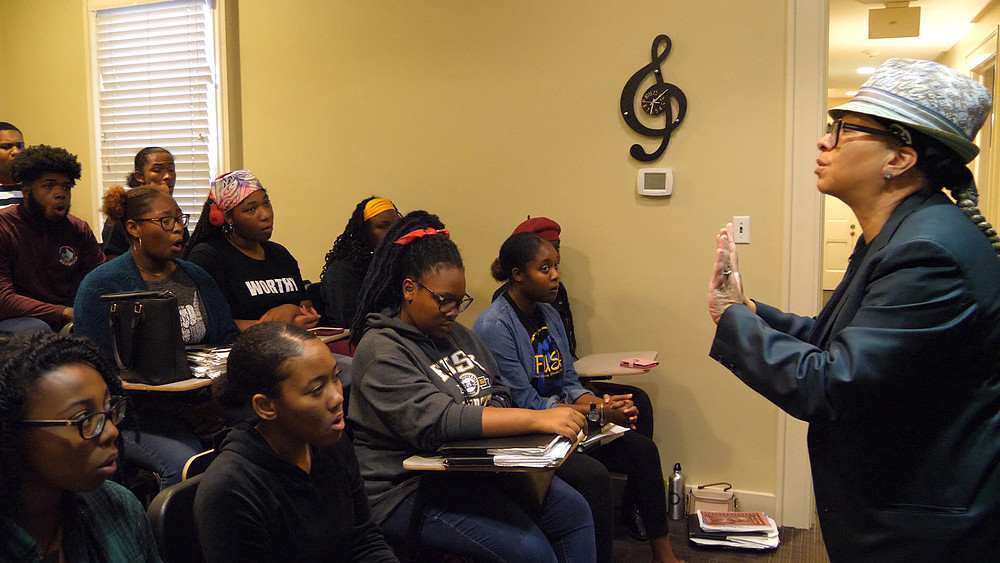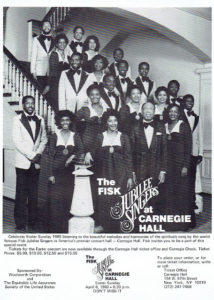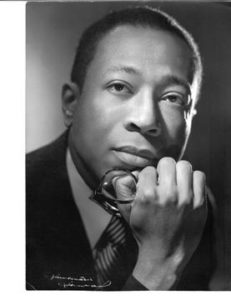
Ever since the choir began in 1867 with an important mission, directing the Fisk Jubilee Singers has always been a position of incredible responsibility. Dr. Matthew Kennedy took on that role for over three decades. A time which saw the choir and Fisk’s students through immense change in the city around them, and a grueling fight for civil rights.
Kennedy was a concert pianist – inspired by his mothers’ singing of spirituals and seeing a live performance by Sergei Rachmaninoff at a formative age. He attended the Juilliard School and fought in World War II. Kennedy married his talented fellow Fisk piano faculty member Anne Gamble, and when they were expecting their first child and were asked if it was a boy or girl, they answered “a pianist.”
That pianist is Nina Kennedy, their only daughter. In addition to her celebrated career, Kennedy has taken on the task of documenting her family’s musical history in documentary and memoir. She joined me this September to remember her father’s time with the Fisk Jubilee Singers.

Answers are edited for length and clarity.
What was your first memory of the Jubilee Singers?

Anne Gamble Kennedy
I believe that is my first memory in life, sitting in rehearsal for the Jubilee Singers. And this was in the chapel. And I remember sitting on my mother’s lap, I was probably still in diapers and I remember there must have been a concert coming up. So they were in their concert attire, but then it was the white skirts with the gold tops. And seeing my father from a distance on the stage, and my mother, and I think my Aunt Margaret was sitting next to us, but it was very clear that this was going to be an important part of my life.
My mother had been the piano accompanist as well, so when I started sitting in on rehearsals, when I was old enough to just sit there by myself, I was evidently really paying attention to the repertoire they were singing. Because as an adult, when I started just going through these memories, I remembered the names of the students as they came through. Because, remember, these are college kids – there’s fresh blood every year.
I remember, very well, when the Jubilee Singers had their centennial celebration at War Memorial Auditorium. Just by the grace of the heavens that happened to be, I think, my father’s best group – his strongest set of voices. The sopranos, the tenors, the basses, it really hadn’t been a group of that quality that I remembered up to that point. And, I don’t think, even since. And that just happened. It just happened.
My father was really a stickler for the operatic tradition. The voice coaching and the exercises and the drills. And he devoted the whole first half hour of the rehearsal to just scales and arpeggios and breathing exercises. And that was what the rehearsals consisted of primarily.
Do you think that was part of the legacy of Mrs. Myers? Because it seems like the attention to the voice itself really was a big part of her vision for the ensemble.
Right. And when you consider, earlier in history, these were operatic voices who didn’t have opportunities at other schools. Either you went to an HBCU or you didn’t get a college education. So just the voice quality was very different for these earlier groups of singers. And I found I did some research on just the history of performers at Carnegie Hall and saw Mrs. Myers’s group on the list several times from the 1920s on. Even beforehand, I think there was a date as early as 1903 where she was with her group of Jubilee singers performing at Carnegie Hall.
And at the same time there was another group of Jubilee singers under Frederick Loudin that was in Europe. My maternal grandmother sang with that group. And I found a suitcase of letters that she had sent during that tour. This was 1893, throughout Great Britain. These were letters that she was sending to her parents in Zanesville, Ohio. A letter a week, four pages front and back for three years. She witnessed the coronation of King Edward VII in London during that tour.
Author note: Singer Nina Clinton’s letters are being compiled by Nina Kennedy for publication. You can read a letter from 1900 on Kennedy’s website.
She was just 18 in 1900. In London as a young black woman, she records how well they were treated. And the only problems they had racism-wise were with Americans who came to some of the hotels where they were staying at in London. But the British loved them. So it’s really eye opening for me.
Academia can be competitive. Did you feel like your dad was supported by the administration and the other faculty?

Fisk Jubilee Singers Carnegie Hall promotion
I remember a lot of heated discussions at home about what had transpired during faculty meetings and such. My father was director. James Lawson was president. And I remember Walter Leonard became president and Walter Leonard just had his hands in everything. He wanted to control the repertoire that the Jubilee Singers sang and that there was one point where he was saying he wanted them to do programs of all spirituals.
It was very important to my father to include some of the European classics, as the original Jubilee Singers had done. This was some madrigals, old English songs and certainly the majority being spirituals. I even found a letter from my father to the president resigning as director of the singers, because the politics was just too much for him.
At Fisk, the story of the 1950s and 60s feels like the first time the story isn’t about trying to stay open or about the Jubilee Singers. It’s about the civil rights movement.
Right.
Did Dr. Kennedy play any part? Was he sort of observing and supporting how he could? How direct was his role in that?
Meharry Medical College, or Meharry Hospital back then, was the only hospital that would accept African-Americans. And the railroad tracks intersected the main street going straight to the emergency room. So a lot of ambulances were stuck in traffic, stuck by these freight trains, where people died as a result. So I think it was the 1970s when the Jubilee Singers Memorial Bridge was approved and erected. And in the photograph on the front page of The Tennessean is part of that group shoveling the dirt to start the construction of the actual bridge.
Read More: The construction of the bridge was covered in the New York Times.
But in terms of the civil rights movement, he really was kind of tight lipped about that. He didn’t want to get the kids into any trouble. From his generation, he had to stay out of trouble. That’s the only way he survived in rural Georgia in the 1930s and 40s. He was very submissive.
But also I do remember some bomb threats. From a white supremacist group before Jubilee Singers, concerts and concerts that were scheduled in Alabama and Mississippi. So he’s in charge of these groups of students. The parents of these students have just handed them over, trusting the school and trusting my dad with their safety. And that was his primary concern. He just wanted the kids to stay out of trouble.
It seems like such a common thread through the historic story of the choir. Leaving for those original tours, some of the family members of the singers were saying, “don’t go right now, our people leave and they don’t come back,” right?
Right
Safety must have been such a huge responsibility.
Consider for so much of that time they were touring the South. I couldn’t even stay in hotels. Churches would usually get their members to donate their homes, they’d bring food. It was totally a community event whenever the singers would come to perform.
What were the tours like for you?
I really enjoyed being with the students. And the students were just so much fun. Always laughing and telling jokes, and pranksters.
And for us as a family, I think that those were our most pleasant times. When we were home, my mother suffered from depression, resulting from feeling unappreciated at best. She was certainly underpaid as a female and just not given the respect that she deserved at that time.
Anne Gamble Kennedy was a concert pianist and faculty member at Fisk where, like throughout academia at the time, her salary was considered by administration to be part of her husband’s pay.
When we were on the road together as a family, we felt the happiest. It really wasa lot of fun for me. And also getting some firsthand knowledge of promotion for a concert, and what was necessary. When they performed at the Kennedy Center in Washington, I remember meetings with the tour manager and how they talked about advertising and promotion of tickets, ticket sales, all of those details that go into a concert tour. That was really some valuable information that helped prepare me for my own tours when I started going on the road.

Dr. Matthew Kennedy
What was your father like?
Looking back I can see that he was under a tremendous amount of pressure just to make sure these kids came home safely from these trips.
I remember being in California. Right near Anaheim, and, of course, the students wanted to go to Disneyland. And there was no time. We had just arrived there at the hotel like the day before the performance, and I remember he explicitly said “there is no time for Disneyland.” And we were getting into the elevator, going to the concert hall, and then kids were coming up from the lobby who had just been to Disneyland. And I looked… and they all looked… like, “oh, what’s going to happen?” And I looked at my father, you know, just waiting for the explosion. And he just said, “get dressed, get to the concert hall.”
I think he saved a lot of his explosions for when he was at home with my mother and me. I do remember some outbursts in the rehearsals. He was usually very calm, you know, hardly lost his temper. But a couple of times I remember some of the students goaded him. One made a comment about, you know, the repertoire by white male composers. And he kind of lost it at that. But for the most part, he was very calm.
Knowing what the Jubilee Singers have achieved now – including the Grammy, what would you want to tell your dad about what the choir has done in these last few years?
He’s very much aware of what’s going on here.
I know he’s watching very closely. He’s very much aware of what is happening and is very happy about this Grammy Award, which was a long time coming.

